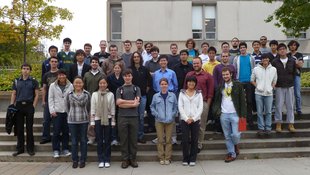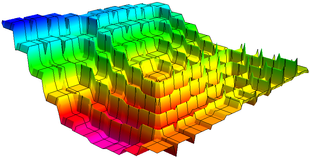10-327/Homework Assignment 2: Difference between revisions
No edit summary |
|||
| (9 intermediate revisions by 2 users not shown) | |||
| Line 11: | Line 11: | ||
===Suggestions for Good Deeds=== |
===Suggestions for Good Deeds=== |
||
Annotate our Monday videos (starting with {{10-327/vp|0927}}) in a manner similar to (say) {{dbnvp link|AKT-090910-1|AKT-090910-1}}, and/or add links to the blackboard shots, in a manner similar to {{dbnvp link|Alekseev-1006-1|Alekseev-1006-1}}. Also, make ''constructive'' suggestions to me, {{Dror}} and / or the videographer, Qian (Sindy) Li, on how to improve the videos and / or the software used to display them. Note that "constructive" means also, "something that can be implemented relatively easily in the real |
Annotate our Monday videos (starting with {{10-327/vp|0927}}) in a manner similar to (say) {{dbnvp link|AKT-090910-1|AKT-090910-1}}, and/or add links to the blackboard shots, in a manner similar to {{dbnvp link|Alekseev-1006-1|Alekseev-1006-1}}. Also, make ''constructive'' suggestions to me, {{Dror}} and / or the videographer, Qian (Sindy) Li, on how to improve the videos and / or the software used to display them. Note that "constructive" means also, "something that can be implemented relatively easily in the real world, given limited resources". |
||
{{Template:10-327:Dror/Students Divider}} |
{{Template:10-327:Dror/Students Divider}} |
||
| Line 24: | Line 24: | ||
*[[User:Xwbdsb|Xwbdsb]] 00:39, 2 October 2010 (EDT) I have a question about problem 13 on page 101. What does <math>x\times x</math> mean when <math>x</math> is an element in <math>X</math>? Does the author mean the ordered pair <math>(x,x)</math>? And we assume that we put product topology on <math>X \times X</math>? -Kai |
*[[User:Xwbdsb|Xwbdsb]] 00:39, 2 October 2010 (EDT) I have a question about problem 13 on page 101. What does <math>x\times x</math> mean when <math>x</math> is an element in <math>X</math>? Does the author mean the ordered pair <math>(x,x)</math>? And we assume that we put product topology on <math>X \times X</math>? -Kai |
||
** Yes and yes. [[User:Drorbn|Drorbn]] 07:19, 2 October 2010 (EDT) |
** Yes and yes. [[User:Drorbn|Drorbn]] 07:19, 2 October 2010 (EDT) |
||
*** I found a way to approach this problem but I am not sure about the technicality. <math>X \times X</math> is Hausdorff. We take any point in <math>\ |
*** I found a way to approach this problem but I am not sure about the technicality. <math>X \times X</math> is Hausdorff. We take any point in <math>\Delta</math> complement. So we can separate it from any point in <math>\Delta</math>. But to separate it from the entire <math>\Delta</math> we need to get the intersection of all its open nbds. Will that still be a valid open nbd? -Kai [[User:Xwbdsb|Xwbdsb]] 11:29, 2 October 2010 (EDT) |
||
**** An arbitrary intersection of open sets is not necessarily open. This I'll say, but beyond this, it is your problem to solve. [[User:Drorbn|Drorbn]] 16:21, 2 October 2010 (EDT) |
|||
Latest revision as of 21:43, 11 November 2010
| ||||||||||||||||||||||||||||||||||||||||||||||||||||||||||||
Reading
Read sections 17 through 21 in Munkres' textbook (Topology, 2nd edition). Remember that reading math isn't like reading a novel! If you read a novel and miss a few details most likely you'll still understand the novel. But if you miss a few details in a math text, often you'll miss everything that follows. So reading math takes reading and rereading and rerereading and a lot of thought about what you've read. Also, preread sections 22 through 24, just to get a feel for the future.
Doing
Solve the following problems from Munkres' book, though submit only the underlined ones: Problems 6, 7, 8, 13, 14, 19abc, 19d, 21 on pages 101-102, and problems 7a, 7b, 8, 9ab, 9c, 13 on pages 111-112.
Due date
This assignment is due at the end of class on Thursday, October 7, 2010.
Suggestions for Good Deeds
Annotate our Monday videos (starting with Video: ![]() Topology-100927) in a manner similar to (say)
Topology-100927) in a manner similar to (say) ![]() AKT-090910-1, and/or add links to the blackboard shots, in a manner similar to
AKT-090910-1, and/or add links to the blackboard shots, in a manner similar to ![]() Alekseev-1006-1. Also, make constructive suggestions to me, Dror and / or the videographer, Qian (Sindy) Li, on how to improve the videos and / or the software used to display them. Note that "constructive" means also, "something that can be implemented relatively easily in the real world, given limited resources".
Alekseev-1006-1. Also, make constructive suggestions to me, Dror and / or the videographer, Qian (Sindy) Li, on how to improve the videos and / or the software used to display them. Note that "constructive" means also, "something that can be implemented relatively easily in the real world, given limited resources".
| Dror's notes above / Student's notes below |
Remark on the Due Date
- Dear Professor Bar-Natan, October 5 seems like a Tuesday. Do you mean October 7, 2010? Thanks! Fzhao 23:42, 30 September 2010 (EDT)Frank
- I stand corrected. Drorbn 06:33, 1 October 2010 (EDT)
Questions
- Hi, I have a quick question. In the last question on the assignment that is being marked, what does it mean for one function to "uniquely determine" another. Sorry, I have just never heard that terminology before. - Jdw
- It means that any two functions with the property stated in the question are actually the same. Drorbn 07:19, 2 October 2010 (EDT)
- Xwbdsb 00:39, 2 October 2010 (EDT) I have a question about problem 13 on page 101. What does [math]\displaystyle{ x\times x }[/math] mean when [math]\displaystyle{ x }[/math] is an element in [math]\displaystyle{ X }[/math]? Does the author mean the ordered pair [math]\displaystyle{ (x,x) }[/math]? And we assume that we put product topology on [math]\displaystyle{ X \times X }[/math]? -Kai
- Yes and yes. Drorbn 07:19, 2 October 2010 (EDT)
- I found a way to approach this problem but I am not sure about the technicality. [math]\displaystyle{ X \times X }[/math] is Hausdorff. We take any point in [math]\displaystyle{ \Delta }[/math] complement. So we can separate it from any point in [math]\displaystyle{ \Delta }[/math]. But to separate it from the entire [math]\displaystyle{ \Delta }[/math] we need to get the intersection of all its open nbds. Will that still be a valid open nbd? -Kai Xwbdsb 11:29, 2 October 2010 (EDT)
- An arbitrary intersection of open sets is not necessarily open. This I'll say, but beyond this, it is your problem to solve. Drorbn 16:21, 2 October 2010 (EDT)
- I found a way to approach this problem but I am not sure about the technicality. [math]\displaystyle{ X \times X }[/math] is Hausdorff. We take any point in [math]\displaystyle{ \Delta }[/math] complement. So we can separate it from any point in [math]\displaystyle{ \Delta }[/math]. But to separate it from the entire [math]\displaystyle{ \Delta }[/math] we need to get the intersection of all its open nbds. Will that still be a valid open nbd? -Kai Xwbdsb 11:29, 2 October 2010 (EDT)
- Yes and yes. Drorbn 07:19, 2 October 2010 (EDT)

